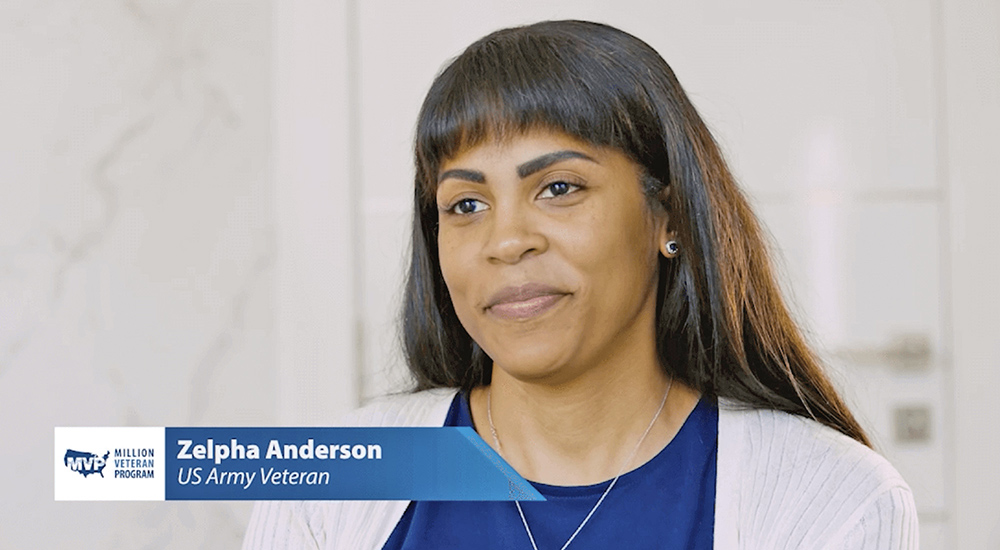Sitting in a trailer in Southern Iraq, using a calling card to call home to her young children, Zelpha Anderson felt torn between two worlds.
At that time, in 2005, there was no Skype or Facetime to help families stay connected. All she had was a landline she shared with other soldiers. One-by-one, after dinner, they took turns calling home to hear their loved ones’ voices.
But as a young mother in a war zone, hearing the small voices of her children from a world away, the calls brought Anderson joy and heartbreak. “My kids didn’t want to speak to me for the first two weeks because they didn’t understand why Mommy was gone,” she said.
This was part of her sacrifice.
Anderson served nine years as an Army finance technician and deployed to Iraq when her children were young. Her son had just turned one, and her daughter was only two.
Veteran’s Children Inspire Her to Join Health Research Program – YouTube
The weight of war
A few times a month, Anderson would put on her flak vest and grab a heavy rucksack containing American dollars. Using all her strength, she would haul her gear and the rucksacks into an armored Humvee. Soon, the engines were roaring as they left the safety of Camp Echo and headed into the desert.
As an Army finance soldier, it was Anderson’s job to deliver advance payments to soldiers who needed it at foreign operating bases across the region.
Each time they approached a base, Anderson felt a knot in her stomach grow into a heavy sense of dread. Everyone knew they were carrying a valuable delivery and she felt vulnerable. “You’re in this heightened state, having to be aware all the time of a potential threat both on and off base. There’s a lot of anxiety being in that space and never knowing what’s going to happen, or when it could happen,” she said.
The weight of the gear and the rucksacks haunt Anderson through pain in her back, knees and joints. The Fourth of July, a holiday she used to love, now brings a sense of dread knowing the evening will come with the boom of distant fireworks that remind her of mortars.
Even though it’s been years since her deployment, she still lives with its effects and works with a team of providers on a lifelong journey of recovery.
Giving back to her community
Last year, Anderson learned about a program that caught her attention. It’s VA’s largest research effort to improve health care for Veterans, and it’s also the largest source of genetic data on Black Americans.
As an Afro-Latina, Anderson is passionate about helping her community and other Veterans like her. By joining VA’s Million Veteran Program, she’d share information with VA researchers about her genes, health, lifestyle and military experiences. They’d use her data to better understand health conditions in Veterans and learn how to better prevent and treat diseases. Each Veteran who joins opens a unique window into Veterans’ health for researchers.
“I hope that my DNA will lead to more precise medicine and more precise care plans for people that are like me. So as a Latina and a Black American, I think what I can provide to the program may have some benefit to future Veterans of color,” she added.
With that, she rolled up her sleeve, gave a small blood sample, allowed secure access to her health records and became one of 925,000+ Veterans enrolled in MVP.
Make a difference for Veterans like you. Join the Million Veteran Program today.
The Million Veteran Program is inviting over one million Veterans to help us understand how genes, lifestyle, military experiences and exposures affect your health and wellness.
Thanks to Anderson and now more than 925,000 Veterans in the Million Veteran Program, we understand certain health conditions better than we ever have. To learn more and sign up, visit mvp.va.gov or call 866-441-6075. You do not need to receive VA health care to join VA’s Million Veteran Program.
Topics in this story
More Stories
Study underscores important role COVID vaccination can have in protecting Veterans from infection and reducing long-term health consequences
Columbia VA’s robotic surgery teams completed their 800th robotic surgery and are on schedule to hit 1,000 by the end of the year.
In a decentralized clinical trial, Veterans can participate from their own homes or local VA instead of having to travel to a research site.






